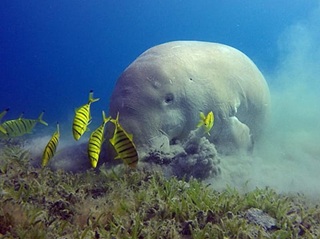(Prelims: Current Events)
(Mains GS Paper 3: Environment and Ecology; Environmental Conservation; Environmental Impact Assessment) |
Why in News?
The International Union for Conservation of Nature (IUCN) has recently recognized India's first dugong conservation reserve located in the Palk Bay of Tamil Nadu.

India's First Dugong Reserve
- The Tamil Nadu government declared an area of 448.34 sq km as a dugong reserve under the Wildlife Protection Act, 1972 in September 2022.
- This area is located in the northern part of the Palk Bay and has approximately 12,250 hectares of seagrass beds, which are the primary feeding grounds for dugongs.
Key Points
- The reserve received international recognition at the IUCN World Conservation Congress 2025.
- 98% of the countries and government agencies and 94.8% of non-governmental organizations and research organizations voted in support of it.
- The efforts of the Tamil Nadu government, including dugong rescue, compensation to fishermen, and awareness campaigns, were appreciated.
- 16 dugongs have been rescued and released back into the sea from 2021 to September 2025.
- Fishermen have been given a total of ₹2.75 lakh as compensation and reward for informing the administration immediately about any accidentally caught dugongs.
About Dugongs
- Dugong (Dugong dugon) is a marine herbivorous mammal.
- It primarily feeds on seagrass and is also known as the "sea cow".
- Dugongs are listed as "Vulnerable" in the IUCN Red List.
- In Indian waters, this species is found in the Palk Bay, Gulf of Mannar, and the Andaman and Nicobar Islands.
- World Dugong Day is celebrated every year on May 28th.
Characteristics
- A herbivorous marine mammal, entirely dependent on seagrass.
- Slow-moving and gentle-natured.
- Can live for up to 70 years.
- Plays a vital role in maintaining the balance of the marine ecosystem.
Conservation Efforts
- Government Initiatives: The Tamil Nadu government has initiated a new program of compensation for fishermen to encourage their cooperation.
- Community-Based Conservation: Fishermen are now encouraged to report any sightings of dugongs to the authorities instead of concealing them.
- Scientific Initiatives: Work is underway on seagrass conservation and restoration.
- International Cooperation: International partnerships and technical support are facilitated through the IUCN.



